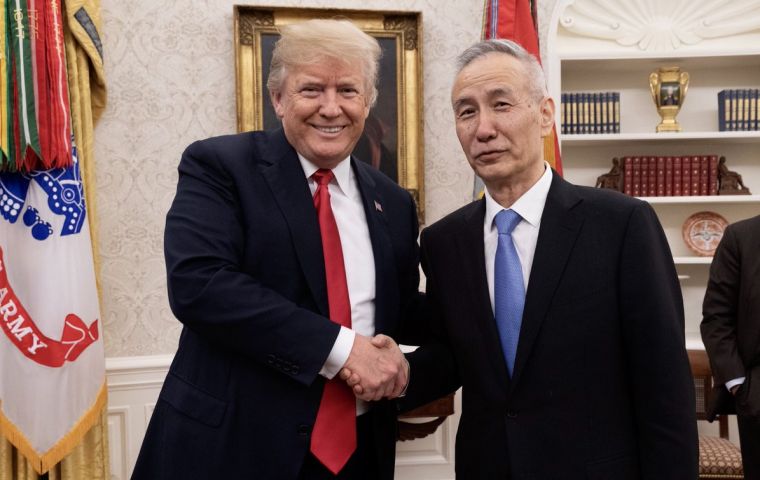MercoPress. South Atlantic News Agency
Summit with Xi, “soon”, should seal “the biggest deal ever made” forecasts Trump
 Trump, during a meeting with Chinese Vice Premier Liu He, said he was optimistic that the world’s two largest economies could reach “the biggest deal ever made”
Trump, during a meeting with Chinese Vice Premier Liu He, said he was optimistic that the world’s two largest economies could reach “the biggest deal ever made”  No specific plans for a meeting with Xi were announced, but Trump said there could be more than one meeting
No specific plans for a meeting with Xi were announced, but Trump said there could be more than one meeting U.S. President Donald Trump said on Thursday he will meet with Chinese President Xi Jinping soon to try to seal a comprehensive trade deal as Trump and his top trade negotiator both cited substantial progress in two days of high-level talks.
Trump, speaking at the White House during a meeting with Chinese Vice Premier Liu He, said he was optimistic that the world’s two largest economies could reach “the biggest deal ever made.”
The Chinese trade delegation said in a statement that the two days of high-level talks made “important progress,” China’s official Xinhua news agency reported.
No specific plans for a meeting with Xi were announced, but Trump said there could be more than one meeting. U.S. Trade Representative Robert Lighthizer and Treasury Secretary Steven Mnuchin were invited to bring a U.S. negotiating team to Beijing around mid-February, with dates still pending.
At the end of the talks next door to the White House, Liu told Trump that China would make a new, immediate commitment to increase soybean purchases. An administration official later clarified the amount as a total of 5 million tons, effectively doubling the amount bought by China since resuming limited purchases in December.
U.S. soybean sales to China, which totaled 31.7 million tons in 2017, were largely cut off in the second half of last year by China’s retaliatory tariffs and the announcement drew a positive reaction from Trump, who said it would “make our farmers very happy.”
The Chinese delegation’s statement said China will expand imports of U.S. agricultural, energy, service and industrial products, according to Xinhua.
While China has offered increased purchases of U.S. farm, energy and other goods to try to resolve the trade disputes, negotiators dug into thornier issues, including U.S. demands that China take steps to protect US intellectual property and end policies that Washington says force U.S. companies to turn over technology to Chinese firms.
U.S. Trade Representative Robert Lighthizer said there was “substantial progress” on these issues, including verification mechanisms to “enforce” China’s follow-through on any reform commitments it makes.
“At this point, it’s impossible for me to predict success. But we’re in a place that if things work out, it could happen,” Lighthizer said at the Oval Office meeting.
Later, he told reporters that the U.S. objective was to make China’s commitments “more specific, all-encompassing and enforceable” with a mechanism for taking action if China fails to follow through, but declined to provide specific issues.
Asked whether the two sides discussed lifting U.S. tariffs on Chinese goods, Lighthizer said tariffs were not part of the talks.
The White House said in a statement that a scheduled March 2 tariff increase on US$ 200 billion of Chinese goods to 25% from 10% was a “hard deadline” if no deal was reached by March 1.
Trump said he did not think he would need to extend the deadline. “I think when president Xi and I meet, every point will be agreed to,” Trump added.
The U.S. complaints on technology transfers, and intellectual property protections, along with accusations of Chinese cyber theft of American trade secrets and a systematic campaign to acquire U.S. technology firms, were used by Trump’s administration to justify punitive tariffs on $250 billion worth of Chinese imports.
Chinese officials have said their policies do not coerce technology transfers. The Chinese delegation said China will actively respond to U.S. concerns on intellectual property and creating a fair market environment, Xinhua reported.




Top Comments
Disclaimer & comment rules-

Read all commentsREF: “the biggest deal ever made”
Feb 03rd, 2019 - 09:28 am 0Now that the Trump-Towers Project is on hold in Russia; perhaps there will be Trump-Towers in China?
BESIDES:
https://www.wsj.com/articles/russias-missile-defense-draws-a-new-iron-curtain-against-u-s-military-11548255438?mod=e2tw
Commenting for this story is now closed.
If you have a Facebook account, become a fan and comment on our Facebook Page!